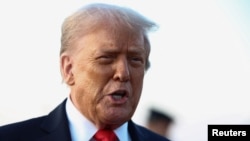European leaders will visit the United States this week to discuss how to end the war in Ukraine, US President Donald Trump said on September 7 after Russia pounded the Ukrainian capital with a new major drone strike.
Trump, who did not specify which European leaders would travel to the US, also said he would speak to Russian President Vladimir Putin soon and expressed confidence that his efforts to end the war would be successful.
“We’re going to get it done -- the Russia Ukraine situation -- we are going to get it done. I have confidence we are going to get it done,” Trump told reporters after returning to Washington from the US Open tennis tournament in New York City.
Trump again said that he is "very disappointed" in Putin and said both he and first lady Melania Trump were "disappointed that this ridiculous war continues" as his efforts to convince Russia and Ukraine to agree to hold talks to end the war falter. He has previously set ultimatums and deadlines, including the threat of further sanctions, if Russia won’t strike a peace deal.
Trump's comments came a day after Russia launched a major drone attack on Kyiv.
Ukrainian air defenses were active late on September 6 and early September 7 repelling the drone attack, while drone alerts were also sounded in Ukraine's Kherson, Dnipropetrovsk, and Zaporizhzhya regions.
Kyiv Mayor Vitali Klitschko said at least three people were killed -- an infant child, a young woman, and an elderly woman -- and 11 people were hurt when several high-rise apartments were set on fire by falling debris from Russian drones.
Ukrainian President Volodymyr Zelenskyy on September 6 rejected an offer from Putin to travel to Moscow for peace talks and instead challenged him to come to Kyiv.
""He can come to Kyiv," Zelenskyy told ABC News.
"I can't go to Moscow when my country's under missiles, under attack, each day. I can't go to the capital of this terrorist."
The Ukrainian president added that Putin's offer was intended to "postpone the meeting," and that the Russian leader was "playing games with the United States."
Putin had earlier downplayed the value of meeting with the Ukrainian president, but also suggested that he would be willing to meet with him, but only on home soil.
"The best place for this is the Russian capital, in Hero City Moscow," Putin said during an economic forum in the Pacific port city of Vladivostok on September 5.
Ukrainian authorities have reported an apparent change in tactics by Russian forces near the strategic and long-fought-over city of Pokrovsk in the Donetsk region.
A Ukrainian unit responsible for Pokrovsk said a force of Russian marines is attempting to penetrate the city at various points in small groups, seeking out Ukrainian artillery sites and drone operators.
Russian forces using tanks and armored vehicles also appear to be trying to encircle Pokrovsk in preparation for a later assault on the city, which had a prewar population of some 60,000 but now is mainly in ruins.
"According to available information, Russia is planning to deploy its troops in the Donetsk region for a so-called 'decisive breakthrough,'" the Ukrainian unit wrote on social media.
Zelenskyy has warned over the past two weeks that Russia is organizing forces for a major autumn offensive.
The exchanges come after Putin offered a blunt message to Kyiv's Western partners after they pledged a postwar "reassurance force" to bolster their ally, saying that any of their troops deployed to Ukraine would be targeted by Russia.
"If any troops appear there, especially now while fighting is ongoing, we assume that they will be legitimate targets," Putin said.
This follows a series of high-profile diplomatic events in China that gave Putin the valuable optics of showing he's not isolated on the global stage, despite his break with the West following Moscow’s 2022 full-scale invasion of Ukraine.
Speaking in Beijing, Putin said Russia is willing to fight to achieve all its objectives if Ukraine does not agree to a deal.
He also hinted that Western security guarantees after a future peace deal would not relate to the areas in eastern Ukraine whose inhabitants had voted to join Russia -– a reference to widely criticized elections held in the aftermath of their occupation and annexation by Russian forces.
European Council President Antonio Costa said earlier that the European Union would send a delegation to Washington to prepare new joint sanctions against Russia.
“We are working with the United States and other like-minded partners to increase our pressure through further direct and secondary sanctions,” Costa told a news conference in Ukraine on September 5.
EU Commission President Ursula von der Leyen announced that the bloc’s 19th package of sanctions against Russia since Moscow's full-scale invasion would be unveiled in early September.










